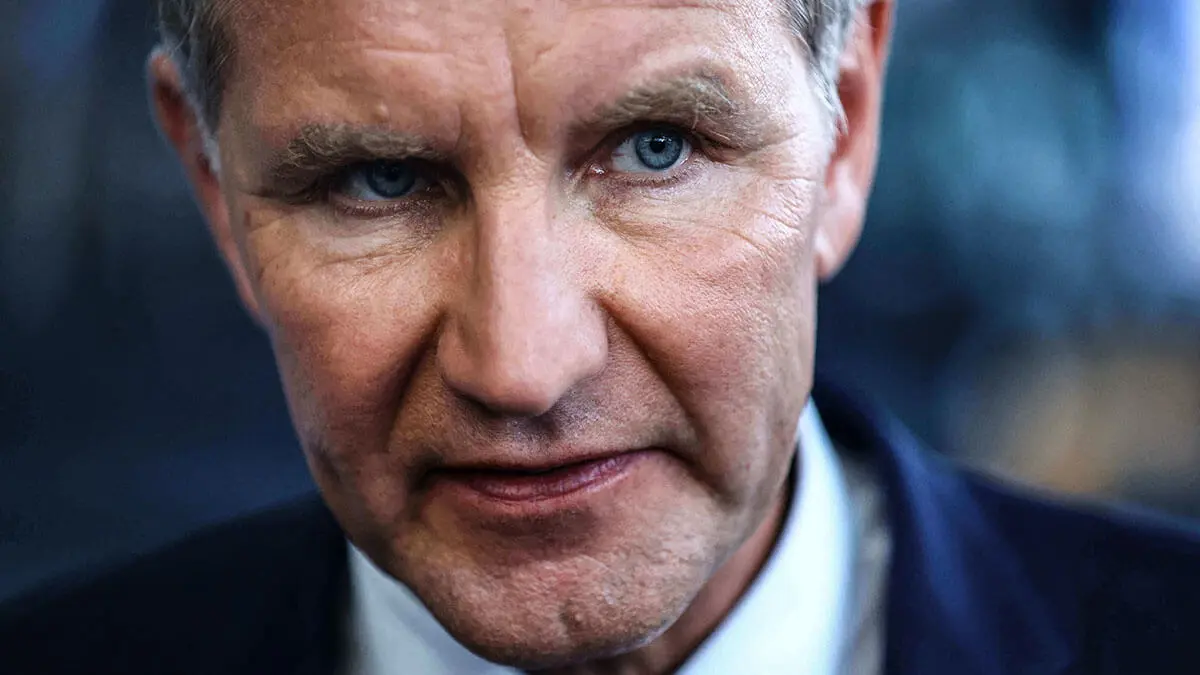Germany and the stench of a past that threatens to return

The federal government is formed by a coalition of parties with the Social Democrats (SPD), the Coalition of Greens and the Liberals, and they are the ones who hold the current chancellor, Olaf Scholz, in power, whose performance in government has been highly questioned after this recent electoral debacle, which adds to last year's debacle.
Not surprisingly, AfD has become the first far-right party to win a state election in Germany since the Nazi era, which is a devastating blow for moderates and centrists.
The far-right party is already the fastest growing political group in the eastern state of Thuringia, winning 32.8 per cent of the vote and coming second in Saxony with 30.6 per cent of the vote.
The general elections will be held on 28 September 2025, as announced by German President Frank-Walter Steinmeier. In fact, before the regional elections in Thuringia and Saxony on 1 September, Chancellor Scholz himself said that his greatest wish was to stand again next year for another term as chancellor.
However, it seems that Scholz is unable to escape the unpopularity suffered by his counterparts such as French President Emmanuel Macron, who lost the legislative elections on 7 July, cornered by the overwhelming success of the far-right Marine Le Pen and the coalition formed by the left and ultra-left parties that seek to avoid, at all costs, the far-right becoming installed in the Elysée Palace.
In Germany, Scholz's centre-left coalition fell to fifth place in both states. If federal elections were held this week, polls warn that AfD could become the second-largest group in the Bundestag, with the SDP in third place.
‘We have seen some very bitter results. All democratic parties are called upon to form stable governments without right-wing extremists,’ Scholz said in a statement.
‘Our country cannot and must not get used to this. The AfD is damaging Germany. It is weakening the economy, dividing society and ruining our country's reputation,’ the current chancellor remarked.
If other parties heed Scholz's call to reject any coalition with AfD, the Christian Democratic Union (CDU), the main centre-right party that is expected to come first in Saxony and second in Thuringia, would benefit.
However, in a sign of the shift to the right in German politics, the CDU is taking a much harder line against immigration than the stance taken by its former leader, Angela Merkel.
The elections in post-pandemic Europe are worryingly reflecting a punishment vote against the ruling party and have shown a worrying loss of the centre, while the younger voters of the so-called Generation Z are radically swinging either to the far-right or the far-left.
After the German elections, French Valérie Hayer, president of the liberal Renew Europe party, declared that a dark day for Germany is a dark day for Europe. The outcome of the elections in Thuringia and Saxony is unprecedented’. ‘We will not let Europe give in to racist, anti-Semitic, misogynist and homophobic movements,’ Hayer said.
In Germany in particular, Thuringia and Saxony have been on the boiling point for some time: Thuringia is one of Germany's sixteen Länder and its capital is Erfurt. The state of Saxony, whose capital is Dresden, is also part of the Länder.
Both are medium-sized regions. Thuringia and Saxony are not just any other states: the industrial revolution in the 19th century took root in these regions, and much of the years that followed were marked by intense workers' struggles and a series of changes in the regional geographic map.
And Thuringia, in particular, played a key role during the Nazi period. It was there that National Socialism took off like a fuse and where Adolph Hitler found the most supporters for his party and his ideology. In fact, the first elections in which the National Socialist German Workers' Party (better known as the Nazi Party) contested were won in Thuringia, winning six delegates.
After the fall of the regime, as part of the culmination of the Second World War, the victorious armies divided up Germany, with the eastern part under the Soviet administration of the then USSR, whose ideology was communist, and the western part, with different areas administered by the United States, France and the United Kingdom, with a capitalist ideology.
Thuringia and Saxony, in particular, remained in the Soviet-administered eastern part and after the fall of the Berlin Wall on 9 November 1989, they regained their status as federal states with a finally merged Germany, without walls or dividing lines.
However, they have not managed to shake off the past and while their older generations have historical memory, the younger generations, and therefore more distant from memories of the war and the dangers of extremism, are becoming more radicalised and blame the immigrant for social and economic ills, as well as being against helping Ukraine resist the Russian invasion and, above all, have a cooling of relations with Russia.
Younger people vote extreme
In the regional elections on 1 September, Infratest dimap collected a series of questions on the voter profile at the ballot box and found that the German far right polled best among the under 25s (Generation Z) with 38% of the vote in Thuringia; 36% of the vote among millennials, but only 19% of the vote among the over 70s.
The Berlin-based institute, which offers political and psychological research services and is known for its political positioning surveys, speaks of moderate and centrist political parties ‘caught’ in a kind of pincer movement between anti-establishment, radical and establishment-busting groups.
In Thuringia, AfD supporters boasted of taking a third of the vote; the far right took the opportunity to take to the streets with their banners bearing a large black cross, while in Saxony, the party came second.
The AfD's main proposals are in favour of ethno-nationalism, which consists of defending what is national on the basis of a series of inherited historical values that make language, faith and the ancestral past unique. Nation and nationality are thus defended on the basis of ethnicity.
‘Their command of Generation Z is extraordinary: no other party won even half as much support from this age group as the AfD. When Björn Höcke, the incendiary AfD leader in Thuringia, claimed to represent the party of the young, he was not wrong,’ according to Silvia Jiménez, international analyst, in the daily La Razón.
Infratest Dimap speaks of a changing electorate: ‘Traditionally, the AfD attracted far more men than women. This time, however, it was the most popular party among female voters’.
But also this political, social and electoral analysis firm found that in the previous Thuringian state elections in 2019, 53% of AfD supporters said they had switched to the party mainly out of disappointment with the establishment:
‘And only 39% did so because they thought it had the right answers. Now those proportions are reversed: 40% of those who voted AfD said they did so as a form of protest, while 52% said they did so out of conviction.
According to the exit poll, only a very small minority of these voters supported AfD because of its pro-Russian stance or its denial of climate change. ‘Instead, 36 per cent of them identified immigration as the most important issue and 35 per cent said that crime was their biggest concern’.
Likewise, there are other issues floating in the social and political environment such as: Germany's role supporting NATO against Putin or the sanctions against Russia and the negative effect on the pockets of German consumers of paying for gas and oil. more expensive as Russian energy sources are banned; or what to do about immigration and the acceptance of refugees.
Precisely, the Sahra Wagenknecht Alliance party (BSW), a recently created ultra-left group that has surprised by its good results, also demands more orderly and selective immigration.
Regarding the emergence of BSW on the political scene, the consulting firm Infratest Dimap speaks of another type of voters seduced by their idea of social justice and that the interests of Germans prevail over international interests as well as giving a larger budget for education. Most people over 60 years of age voted for this party, that is, especially Generation X.
Merkel: she saw it coming
Angela Merkel was chancellor of Germany, from 2005 to 2021, and chaired the German Christian Democratic Union (CDU) party from 2000 to 2018.
There are many who question the so-called Merkel era and believe that the current debacle is the legacy of this period of government; In particular, Merkel put her stamp on three issues: 1) Containing the rise of the extreme right; 2) bury Nazism; and, 3) reorganize immigration policy.
In all three there is a reasonable failure. Two years after leaving the government, the far-right with AfD experienced several important victories in medium-sized cities in 2023.
On June 25 last year, the AfD won a district in Sonneberg in the state of Thuringia for the first time; Then, on July 2, the far right won its first mayoralty in Raguhn, a city of 9,000 inhabitants located between Berlin and Leipzig.
Then, on October 8, the AfD made considerable progress in the regional elections in Hesse with 18.4 percent of the vote and in Bavaria with 14.6 percent. It had never before achieved such scores in the states of the former West Germany.
And finally, on December 17, its candidate Tim Lochner won the elections for mayor of Pirna, a city of 40 thousand inhabitants within the state of Saxony.
The success in the recent regional elections in Thuringia and Saxony is not surprising and is perhaps just a harbinger of what may happen next year in the general elections in Germany. The goal is now the Bundestag.
Almost a year before the general elections, the big question is whether Scholz will be able to withstand the pressure or end up dissolving the Bundestag and calling elections. In France, Macron tried to contain the advance of extremism by dissolving the Legislative Assembly and the result was very negative: he lost his prime minister, Gabriel Attal.



